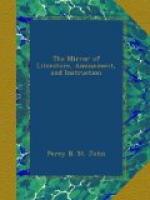The higher or ruling orders saw, in the plain letter of the Bible, the means of amending the rude and savage laws which had governed their forefathers; and religion also afforded the means of improving the whole fabric of the state. In addition to their piety, the clergy were the depositaries of all the learning of the age. All the knowledge which distinguishes civilization from savage life was entrusted to them. Admitted into the supreme councils of the realm, they became an order, possessing acknowledged rights which could not be lawfully assailed. And though they may occasionally have attempted to extend their privileges beyond their proper bounds, yet, in a monarchy, the existence of any one rank or order invested with franchises which the king must not assail, is in itself a strong and direct protection to the privileges of all other ranks of the community. Powerful as the nobles may have been, it is doubtful whether they could have maintained their ground, had they been deprived of the support which they derived from the Bishops and Abbots, who stood foremost in the ranks, amongst the peers of the monarchy. Many a blow which would have cleft the helmet, turned off without harm from the mitre; and the crozier kept many an enemy at bay, who would have rushed without apprehension upon the spear.
To the successors of the Anglo-Saxon prelates, we mainly owe the preservation of the forms and spirit of a free government, defended, not by force, but by law; and the altar may be considered as the corner-stone of the ancient constitution of the realm.
* * * * *
THE GATHERER.
A snapper up of unconsidered trifles.
SHAKSPEARE.
* * * * *
SERMONS.
Mr. Northcote tells us, that a clergyman, a friend of Mr. Opie’s declared to him, that he once delivered one of Sir J. Reynolds’s discourses to the Royal Academy, from the pulpit, as a sermon, with no other alteration but in such words as made it applicable to morals instead of the fine arts.
* * * * *




